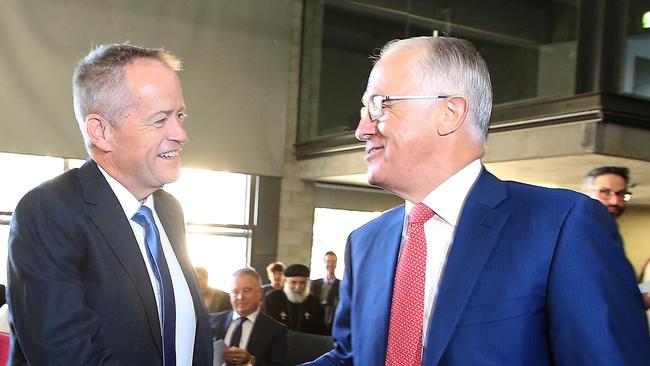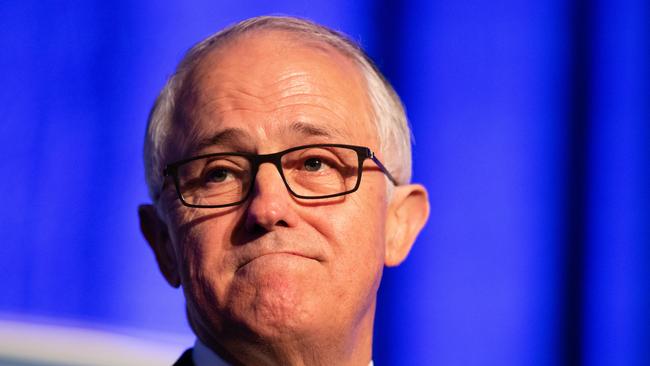‘The other side is worse’ is not an election strategy
SHORTEN may not be popular, but he’s still likely to win the next election because those who dislike the government most are the same people who should be voting Liberal, writes Peta Credlin.
Rendezview
Don't miss out on the headlines from Rendezview. Followed categories will be added to My News.
PEOPLE might be scared of Bill Shorten but they’re not happy with Malcolm Turnbull either. When this is the feedback you get, even at Liberal Party meetings, the government is in desperate trouble because “the other side is worse” is no basis for re-election.
Everyone knows a Shorten government would increase taxes on the most productive people in the economy in order to spend even more on health and education, with no improvement in outcomes.
The unions would be in charge of economic policy and the Greens would be in charge of social policy.
Even so, the most left-wing Labor opposition in history is likely to be elected, because the people who most dislike the government are all the people who should be its supporters.
And were in the past.
Labor people, by and large, don’t have a problem with the Prime Minister, other than a bit of disappointment he’s not been, as PM, the man he was in the leather jacket on the ABC. In fact, Labor supporters by and large think he’s precisely the sort of person who should be leading the Liberal Party; someone not very philosophically different from the sort of people who lead Labor, only richer. But that’s why Turnbull is increasingly toxic on his own side.
Not only has he perpetuated the toxic culture of knifing elected prime ministers — a cancer that’s given us a decade of instability and missed opportunity — but the longer his government lasts, the less like a Coalition government it looks.

The new taxes on superannuation that led to a booth worker strike at the last election still rankle in Liberal heartland, even though Labor would be worse with its hit on dividend imputation credits. The promise of $25 billion more school spending hasn’t stopped a revolt among Catholic school parents now faced with fee increases.
There’s the “cry me a river” bank tax plus the no-we-won’t, yes-we-will royal commission on financial institutions. Worst of all, the “National Energy Guarantee” that’s all about cutting emissions, not cutting prices; this from a government that was first elected to abolish the carbon tax.
Take the Longman by-election. The Liberal primary vote dropped from 45 per cent in 2013 to 39 per cent when the seat was lost in 2016, to just 29 per cent a fortnight ago. The One Nation vote rose from nine per cent at the election, to 16 per cent even though Pauline Hanson was on a holiday rather than on the campaign.
Conventional wisdom holds that the Coalition can’t win with a primary vote in the 30s, given the spray of minor party preferences — but that’s where it’s been for all of Malcolm Turnbull’s 37 consecutive losing Newspolls.

The coming election was never going to be easy to win. The government is seeking a third term on the back of a disappointing record, defending a one-seat majority. The redistribution in Victoria means it’s notionally starting a couple of seats behind. And it’s facing not only a buoyant Labor Party but the unions, GetUp!and the Greens. The Libs should be looking for the issues that might turn a walkover into a contest but, instead, their biggest policy argument with the Opposition is a tax cut for big business — sound economics but terrible politics.
The government’s fundamental problem is that it’s not listening to voters and has no credible answers to the issues troubling them. It keeps telling them that the economy is strong, with record jobs growth and 26 years without a recession.
But the macro-spin is like salt in the wound when they’re hurting at home — with soaring power prices, stagnant wages, unaffordable housing, clogged roads, and a sense the Turnbull government is out of touch.
One of the iron laws of politics is to have your fights with your opponents across the aisle, rather than with your own side. But the government has begged the Labor states for an agreement on emissions reductions while ignoring its own backbenchers who want out of the Paris agreement that’s killing local jobs without helping the environment.
Senior ministers know they have to fight on different issues in order to win the election but they also think the government can’t change its policy without also changing its leader. Some of them can’t admit that they made a mistake last time they did that, while others fear making the same mistake twice. So they bury themselves in their own portfolios, attack the Labor Party ever more fiercely over ever-smaller real policy differences, and quietly resign themselves to defeat.
Will the real Liberals please stand up?
Originally published as ‘The other side is worse’ is not an election strategy


